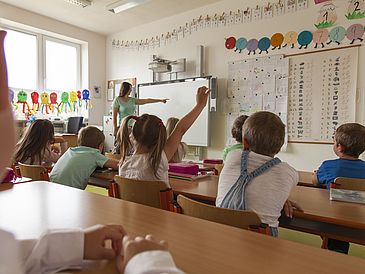“It is often the case that the behavior of affected children is interpreted as them not paying attention or being badly behaved,” says Professor Anja Starke from the University of Bremen. “It is then implied that they have general learning difficulties or that the parents are the cause.” This is due to the fact that children with a developmental language disorder are found to be more scared or hyperactive than other children, for example.
The professor, who is specialized in inclusive education at the University of Bremen, emphasizes that children and youths with a developmental language disorder can be helped. Early treatment by a speech and language therapist can support the linguistic development of children and even reduce or avoid massive aftereffects. In the education sector, trained teaching staff with special needs expertise can aid children’s learning and social participation.
What Is a Developmental Language Disorder?
Developmental language disorders (DLD) occur as the consequence of a primary illness, for example a hearing disorder, or as an isolated disorder during the course of language acquisition. Various linguistic fields and areas of speech may be affected, such as vocabulary, grammar, and pronunciation. The areas of pronunciation, vocabulary, grammar, and communication behavior are differentiated. Usually, several modalities are affected. Individual differences are also typical. Depending on the severity and complexity, the disorder may have a long-term effect on a child’s development and may still exist at school-age.
Motto of this Year’s Awareness Day: “See Me!”
As it is important to recognize possible anomalies at an early age and to treat them expediently, parents and specialist workers should ask experts for their advice if they so wish. This year’s International Developmental Language Disorder Awareness Day is raising awareness for disorders with the motto #DLDSeeMe. Due to the corona pandemic, many of the events will be taking place on social media. Various agents from science and practical fields are preparing info material for parents, teaching staff, and trained pedagogic staff and will make said material available.
In Bremen, the regional Multi-Professional Language Network (“Multiprofessionelle Netwerk Sprache”), in which specialists from schools, language therapy, and research work on the needs of children and youths with language-based abnormalities, will raise awareness for developmental language disorders with a bicycle campaign and info material and will also be available to answer questions.
Further Information:
The Society for Interdisciplinary Language Acquisition Research and Childhood Language Disorders in the German Region (“Gesellschaft für interdisziplinäre Spracherwerbsforschung und kindliche Sprachstörungen im deutschsprachigen Raum”) – GISKID (https://giskid.eu) (in German only).
Internet platform https://radld.org/, which offers a variety of information.
Contact:
Prof. Dr. Anja Starke
Inclusive Pedagogy
University of Bremen
Email: anja.starkeprotect me ?!uni-bremenprotect me ?!.de

